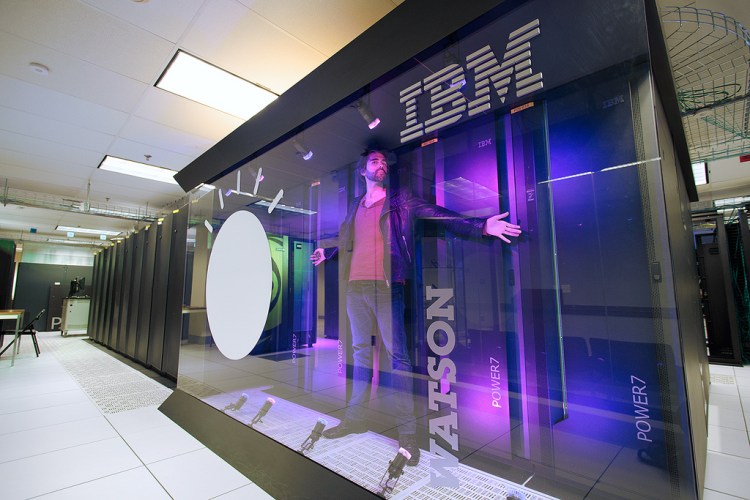IBM was actually founded in uptown Manhattan, near Columbia University, 100 years ago, although it has been based in suburban Armonk, New York, for decades. Google, by comparison, was founded in 1998 in Menlo Park, Calif.
While some look at Big Blue as a staid monolith that throws billions of dollars at the next big thing in tech, be it cloud, security, or machine learning, this IBM is different, insist ‘the suits.’ They point to the Watson Group as prime evidence that IBM is changing, that it’s no longer as unhip and stodgy as its reputation makes it out to be.
In fact, IBM is reaching out to tech hustlers in Manhattan to help direct the company to what is hip, and worth pursuing, in the city’s thriving so-called Silicon Alley. According to Shai Goldman, a VC at 500 Startups, there are about 1,000 startups in New York, roughly 400 of them venture backed.
Tech consultant Teddy Angelus was floored when he recently received a cold call from someone at the Watson Group. The group then hired Angelus for his help in making introductions to the city’s young app developers. Angelus led his new employer to the Turntotech space in lower Manhattan. Thereafter, Angelus led a seminar on Watson for coders who didn’t know what it was.
“It was great,” Angelus said of the Watson meet up. “But there are still many people who don’t know who the hell Watson is. But that’s changing.”
IBM can afford to fail, of course — even if the $1 billion Watson investment doesn’t pay off, it’s a drop in the bucket for a company that posted revenue of $99.7 billion in 2013, down from 2012’s $104.5 billion. IBM’s 2013 net was $16 billion and assets totaled a whopping $126.2 billion.
But company executives aren’t expecting to fail here.
Along with establishing cachet, Watson is also a big potential revenue stream for IBM. While Gold and Karasick declined to say how much cash Watson was pulling in or what their revenue target is for next year, a source told VentureBeat that the company was counting on the Watson Group to become a $1 billion (revenue) startup within five years.
“They are counting on Watson to deliver,” said the source, who declined to be named.
Gold agreed.
“Watson isn’t just a single entity within IBM,” he said. “Watson is growing quickly, and what you’re seeing is a company rallying around the technology.”
Failure, Gold said, is not an option.
“Is Watson going to be the next big destination? Absolutely,” he said.
Watson’s latest focus is mobile, IBM execs told VentureBeat. According to research group Gartner, the mobile space, with its approximately 500 app developers, gaming outfits, ad plays, and brokers, among others, was worth nearly $18 billion last year. That number is expected to surpass $35 billion by the end of this year.
While IBM insists the Watson Group is not acting as the company’s in-house app store, developers are already lining up to build upon its API.
“Anybody that uses Watson pays. We are building a large ecosystem, with Watson as the services platform. So, we’re building up a large ecosystem of apps for domain experts, healthcare, legal services, and the public sector,” Karasick said.
The Watson Group is taking a close look at Google Glass and the app ecosystem being engineered around it by outside developers. The group debuted a “Google Glass” beta program earlier this year, in which IBM employees were asked how they’d incorporate Watson with the glasses.
Those who gave notable answers were given Watson for their iPhones and iPads. Now those same employees can consult Watson’s cognitive abilities on their mobile devices on the go.
Apple and IBM announced a new partnership Monday that caught many by surprise. Apple trumpeted the relationship in a blog post. While the Watson Group wasn’t named in the release, there is speculation about IBM that Watson could soon be working with Apple’s Siri.
Apple did not respond to emails for comment. But Apple chief Tim Cook tweeted Monday:
“Today Apple and IBM announced a landmark enterprise partnership. Thanks Ginni! #Apple #IBM”
The blog post read in part:
“The new IBM MobileFirst for iOS solutions will be built in an exclusive collaboration that draws on the distinct strengths of each company: IBM’s big data and analytics capabilities, with the power of more than 100,000 IBM industry and domain consultants and software developers behind it, fused with Apple’s legendary consumer experience, hardware and software integration and developer platform. The combination will create apps that can transform specific aspects of how businesses and employees work using iPhone and iPad, allowing companies to achieve new levels of efficiency, effectiveness and customer satisfaction — faster and easier than ever before.”
Analyst Wang said the Watson Group, and Watson, would likely change IBM for the better, and he pointed to some of the cutting-edge design teams he’s come across at IBM offices around the world, a stark contrast to the company’s old image.
“You’re seeing the changes with IBM’s design teams, people sporting tattoos, crazy haircuts, piercings, that are building the company’s latest UI user experiences.”
Wang has no doubt the Watson Group is IBM’s ticket to becoming a major disrupter like Google, Twitter, and a few choice others.
“Watson is the real deal,” Wang said. “They’re going full throttle on this thing.”
As for DiTanna, the Watson Group’s 22 year-old senior advisor for digital strategy, he was in agreement that Watson is what will change the face of IBM as a trend-setting, cutting-edge tech juggernaut.
“Watson is a bet for IBM,” he said. “The last time we launched a group like this was the PC business.”
IBM folded that division earlier this century. Many are hoping that same fate won’t befall Watson.



